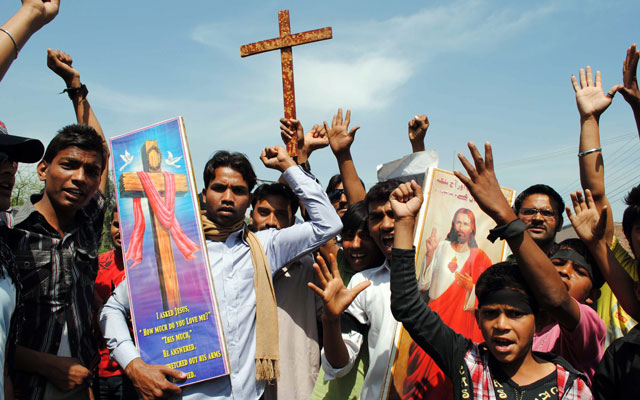More than 3,000 Muslims stormed a Christian enclave in the city of Lahore, Pakistan, and proceeded to burn down an estimated 100 to 160 homes, marking a peak in violence toward religious groups.
The Muslim group was looking for a 28-year-old Christian man who is accused of blaspheming the Islamic prophet Mohammed, a criminal offense under Pakistani blasphemy laws. This latest bout of violence may not lead Pakistan to reconsider its blasphemy laws, but it will certainly draw the international community’s attention to religious persecution in the region.
In Pakistan, blasphemy can result in the death penalty or several years in prison. Blasphemous acts include desecrating a place of worship, burning pages of the Quran, and defaming the Islamic prophet Mohammed. Pakistan’s blasphemy law is leveled only at those blaspheming Islam, and does not provide protection for any other religious group.
An estimated 1,274 people have been accused of violating the blasphemy laws. At present, there are an estimated 16 Pakistanis on death row and another 20 individuals serving life imprisonment for blasphemy against Islam. Thirteen percent of the accused were Christian, 50 percent were Muslim, and the remaining comprise other minority religious groups.
The alleged precise statements of the Christian man in this latest incident are largely unknown. Some observers say that a Muslim man made the accusations of blasphemy against the Christian man in order to seek revenge the morning after the two men had been involved in a drunken brawl. After the police arrested the accused, many Christians fled the region fearing persecution for his alleged statements.
The minority Christian community had reason to fear backlash. Vigilantism is not uncommon in Pakistan, where rioters often take matters into their own hands to settle personal disputes. And just last year, a 14-year-old mentally challenged Christian Pakistani girl was put on trial for burning pages of the Quran. While the charges were ultimately dropped, the trial was representative of Pakistan’s repressive political culture on matters of religion.
Pakistani President Asif Ali Zardari and other senior officials have ordered an investigation into this latest string of events. The Pakistani government has pledged the equivalent of $2,000 in assistance for each family affected.
While a few of the Muslim rioters are now in custody, charges are unlikely to be levied. The fate of the Christian man in custody is still unknown.
Two years ago, Pakistan’s Punjab Governor Salman Taseer and Minority Affairs Minister Shahbaz Bhatti were assassinated by religious extremists because of their efforts to roll back the controversial blasphemy laws. The current Pakistani Ambassador to the U.S., Sherry Rehman, has also been under threat from extremists due to her support for re-examining the legislation and removing the death penalty as punishment. In January the Supreme Court of Pakistan approved admission of a blasphemy case against Ambassador Rehman for remarks she made on a television program in November 2010.
The latest rampage against the Christian community in Pakistan is significant, says Heritage’s Lisa Curtis:
This is yet another example of the growing influence of extremist ideologies that are endangering minority communities and jeopardizing democracy, and will ultimately, if left unchallenged, turn Pakistan into a failed state. Pakistan’s founding father, Muhammed Ali Jinnah, supported the idea of Islam serving as a unifying force in Pakistan and envisioned the country functioning as a multiethnic, multi-religious democracy. Unless and until Pakistan’s leaders recommit to these ideals that helped form Pakistan as a nation state, the country will become engulfed in escalating lawlessness and sectarianism. It is time for Pakistan to draw the line on extremism and protect its minority populations by amending the blasphemy legislation.
